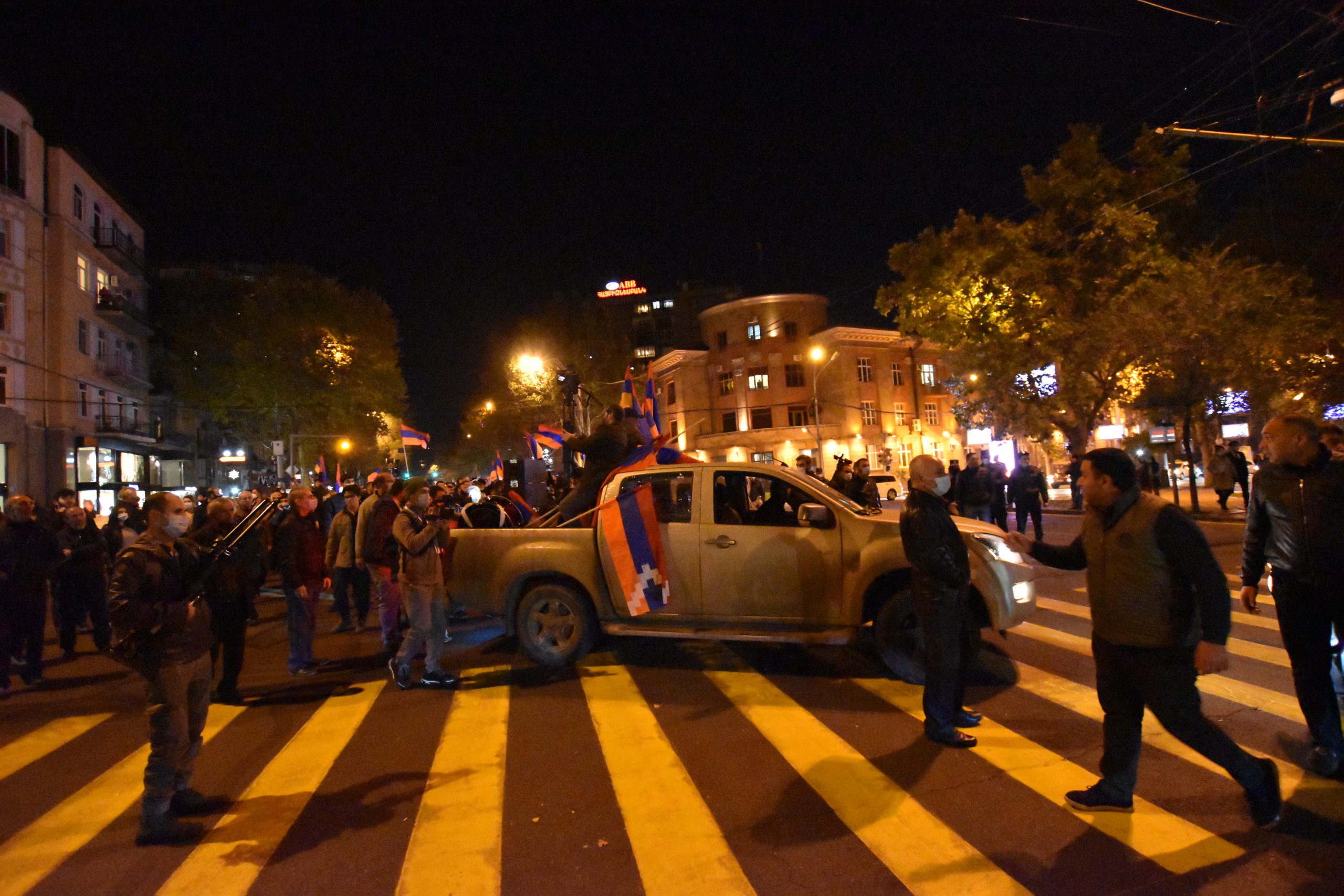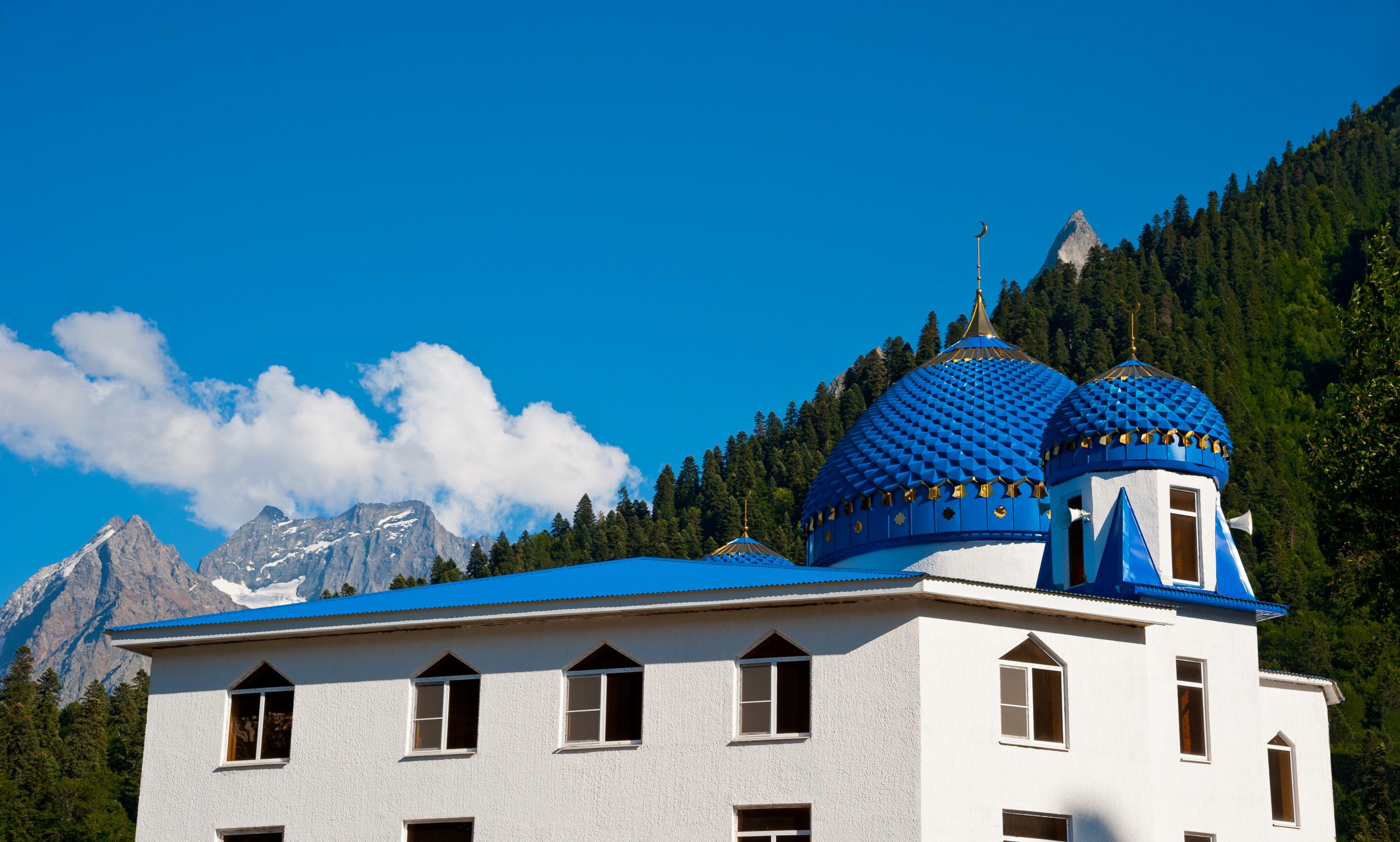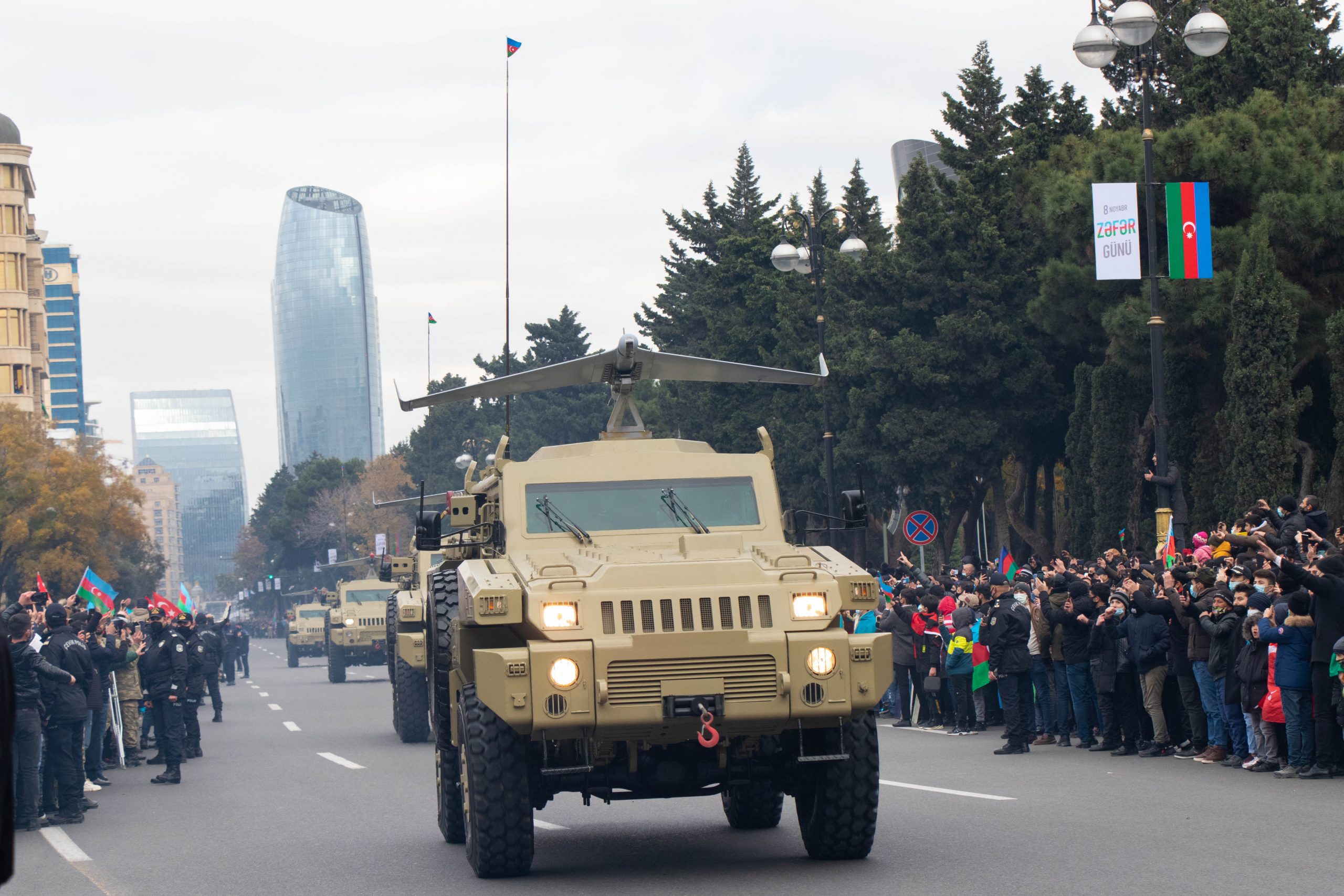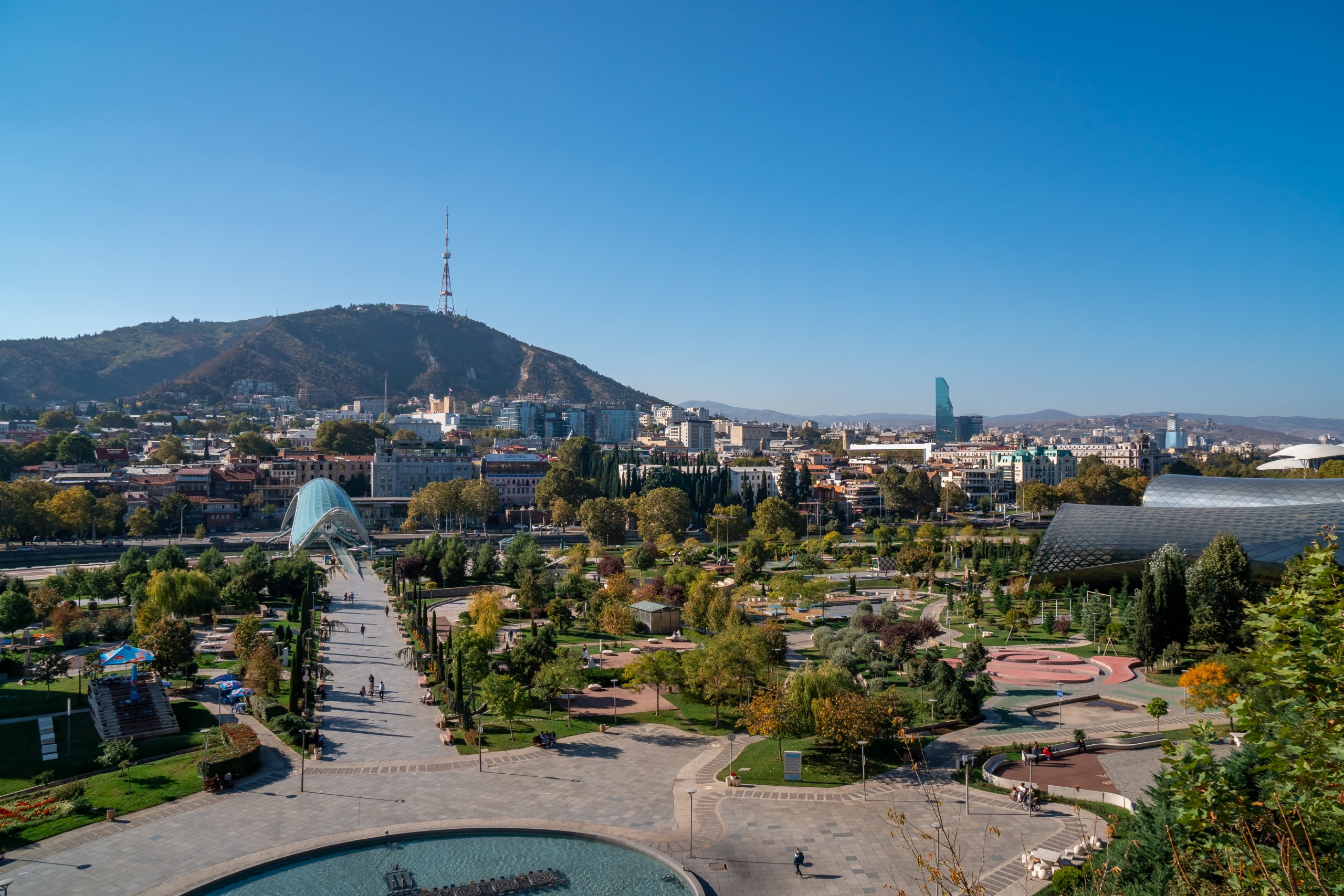Strategic Analysis Caucasus Brief
Bi-weekly review (29.11.-13.12.2020)
Tomáš Baranec
Armenia

Anti-Government Protests, Yerevan. Photo: Cornelius Brandt/ Shutterstock.com
Pressure on Pashinyan grows as opposition nominates candidate on PM while Church joins calls for his resignation
Most of the Armenian opposition groups united in nominating Vazgen Manukian, a former prime minister and ex-defence minister, to head a „transitional, anti-crisis government“ until early parliamentary elections could be held.
In their statement, the 16 opposition parties announced they had set up a „pan-Armenian, nonpartisan“ movement that would include „representatives of political parties, the intelligentsia, and the general public.“ Later in the day, hundreds of people blocked streets in the capital, Yerevan, shouting slogans such as „Nikol, leave!“, reports Radio Free Europe – Radio Liberty.
Opposition and part of Armenian society are angry with Pashinian’s handling of the Nagorno-Karabakh conflict, which ended with the defeat of the Armenian forces.
Meanwhile leaders of the Armenian Church catholicos of All Armenians Karekin II and Aram I, the head of the Catholicosate of the Great House of Cilicia of the Armenian Apostolic Church in Antelias also called on Pashinyan to resign.
Moreover, demands for the PM to leave office have come from all three of the country’s former presidents and mayors of cities in Armenia’s southern province of Syunik, which, according to the tripartite peace declaration is to have a corridor built through it, which will connect the Azerbaijani exclave of Nakhichevan with Azerbaijan proper.
In an interview with the OC Media, political analyst and consultant Eric Hacopian said that despite a large number of citizens who want Pashinyan to step down they are not joining the current protests as they see them to be a vehicle for Armenia’s former governing regime, which was deposed in the “2018 Velvet Revolution”. “The lack of credibility of the current opposition is the primary force keeping Pashinyan in office”, Hacopian explained. “If they want the Prime Minister to leave, they need to exit the political scene for good”.
Sources:
- RFE/RL, „Armenian Opposition Names Joint Candidate In Bid To Pressure PM“, https://www.rferl.org/a/armenian-opposition-names-joint-candidate-in-bid-to-pressure-pm/30982610.html
- OC Media, „Pressure on Pashinyan grows as Church leaders call for his resignation“, https://oc-media.org/pressure-on-pashinyan-grows-as-church-leaders-call-for-his-resignation/
- Arka.am, „Leaders of Armenian Church call on prime minister Pashinyan to resign“, http://arka.am/en/news/politics/leaders_of_armenian_church_call_on_prime_minister_pashinyan_to_resign_video/
For additional information, see:
- Caucasus Watch, „Political crisis in Armenia: newest developments“, https://caucasuswatch.de/news/3323.html?fbclid=IwAR2k17dQN0_It4PogDtAYtK_3Zogc5OerymSwEE4oqdcC2Rcc7ZzCWkqhK8
- OHANYAN Anna, Carnegie Endowment for International Peace, „Is Armenia’s Democracy on Borrowed Time?“, https://carnegieendowment.org/2020/12/11/is-armenia-s-democracy-on-borrowed-time-pub-83438
French National Assembly adopts resolution calling for recognition of Artsakh
The French National Assembly, the lower house of the French parliament, has adopted a resolution on the „need to recognize Nagorno-Karabakh“ on December 3 The vote follows a similar resolution passed in French Senate adopted on November 25 French Foreign Minister Jean-Yves Le Drian condemned the war crimes committed during the war against the population of Nagorno-Karabakh, yet he declined that Paris plans to recognize the separatist statelet.
The French National Assembly voted 188 to 3 to adopt a resolution. The text affirms “the urgent need to reach a final settlement of the conflict guaranteeing the lasting security of the affected civilian populations and the implementation of a process of peace and recognition of Nagorno-Karabakh.”
French MOFA stated during the discussion of the bill that for now even Armenia does not recognize Nagorno-Karabakh and has not asked France for this either. Le Drian stressed that he understands the position of the MPs and himself condemns the war crimes committed during the war against the population of Nagorno-Karabakh, the use of prohibited weapons and mercenaries from Syria.
Sources:
- JAMNews, „Lower house of French Senate adopts resolution on ‘need to recognize Nagorno-Karabakh’“, https://jam-news.net/the-lower-house-of-the-french-senate-adopted-a-resolution-on-the-need-to-recognize-nagorno-karabakh/
- Public Radio of Armenia, „French National Assembly adopts resolution calling for recognition of Artsakh“, https://en.armradio.am/2020/12/03/french-national-assembly-adopts-resolution-calling-for-recognition-of-artsakh/
Russia bans import of Azerbaijani tomatoes and apples. Analysts see a connection with the victory parade in Baku
Russian Agriculture watchdog Rosselkhoznadzor announced on December 8 the embargo on imports of tomatoes and apples from Azerbaijan beginning Thursday, December 10. Some experts believe this move is Moscow’s response on the military parade in Baku.
Agency in its announcement, cited concerns over two types of moth Tuta absoluta and Grapholita molesta, being repeatedly detected in fruits originating from Azerbaijan.
In a similar manner, Moscow also blocks imports from parts of Armenia, Turkey and Uzbekistan, but the ban is much less painful for these countries. For Azerbaijani producers, on the other hand, Russia is the main market.
As Moscow Times reminds, “ban is due to come into force Thursday, the day Azerbaijan stages a large-scale military parade marking its victory over Russian ally Armenia in a six-weeks war over the disputed Nagorno-Karabakh region”.
The embargo is “Russia’s response to Azerbaijan’s victory parade,” said Gubad Ibadoghlu, a policy analyst at the Baku Economic Research Center. Armenia is a key importer of Russian arms and Ibadoghlu believes Azerbaijan’s parade of Armenian military equipment seized during the war “discredits the Russian military-industrial complex.”
Sources:
- The Moscow Times, „Russia Bans Imports of Tomatoes From Azerbaijan“, https://www.themoscowtimes.com/2020/12/09/russia-bans-imports-of-tomatoes-from-azerbaijan-a72292
- Rosselkhoznadzor, “Россельхознадзор вводит временные ограничения на поставки томатов и яблок из Азербайджанской Республики на территорию Российской Федерации (Rosselkhoznadzor introduces temporary restrictions on the supply of tomatoes and apples from the Republic of Azerbaijan to the territory of the Russian Federation)”, https://fsvps.gov.ru/fsvps/news/38847.html
Featured: Azerbaijan takes control over the last from seven districts previously occupied by Armenian separatists
On December 1, the Azerbaijan army took control over the Lachin District, with the exception of the corridor providing communication between Nagorno-Karabakh and Armenia. This is the last of the three districts supposed to be taken over by Azerbaijan under the armistice agreement. However, the status of Armenians living on the territory of the corridor remains unclear.
Unlike the Aghdam and Kaljabar districts, which were handed over as a result of the ceasefire deal on November 20 and November 25 respectively, part of Lachin, the corridor, is to remain under the control of Russian peacekeepers. Ambiguity about that corridor, its precise parameters and sovereignty, resulted into a confusion ahead of the handover, and residents repeatedly got mixed messages over whether their homes were going to be ceded to Azerbaijan. As a result, most of the residents of the city of Berdzor (Az. Lachin) and neighbouring villages have left their homes.
The main reason for the existence of the corridor is that the road connecting Armenia and Nagorno Karabakh runs through it. However current road passes also the city of Berdzor which is the regional centre of Lachin district. Azerbaijani President Ilham Aliev has announced that, within the next three years, the Azerbaijani authorities intend to build a new road between Nagorno-Karabakh and Armenia instead of the Lachin corridor, bypassing the city of Berdzor.
The mayor of the city told local media on December 1 that Russian peacekeepers had said that there should not be any flags flying in the town, and so local authorities had taken down the flag of the unrecognized Nagorno Karabakh Republic. The major, Narek Aleksanyan, also said that there were no Azerbaijani troops in the town, reports Joshua Kucera for Eurasianet.
Altogether seven Azerbaijani districts, occupied by Armenian forces in the first Nagorno Karabakh war, formed a buffer zone surrounding the separatist region. Four of them were taken over by Baku during the fighting in fall 2020, and the remaining three were handed over following the armistice agreement.
According to one international estimate shared with the Eurasianet on condition of anonymity, the territories over which Azerbaijanis have regained control had been home to about 34,000 Armenians. The human rights ombudsman of Karabakh, Artak Beglaryan, said that about 40,000 people had been made homeless as a result of the war.
Sources:
- KUCERA Joshua, Eurasianet.org, „Azerbaijan retakes control of final region as part of ceasefire deal with Armenia“, https://eurasianet.org/azerbaijan-retakes-control-of-final-region-as-part-of-ceasefire-deal-with-armenia
- JAMNews, “Russian peacekeepers, Armenian civilians and the Azerbaijani army: who’s got control of Lachin?”, https://jam-news.net/who-controls-lachin-news-corridor-karabakh-russian-peacekeepers-azerbaijan-ilham-aliyev/
- Caucasian Knot, „Azerbaijani President announces new Lachin corridor“, https://www.eng.kavkaz-uzel.eu/articles/52942/
- Caucasian Knot, “Peacemakers‘ presence fails to convince Armenians of life safety in Lachin Corridor”, https://www.eng.kavkaz-uzel.eu/articles/52984/
Azerbaijani president signalizes territorial claims on Zangezur, Sevan and Yerevan
During the military parade in Baku on December 10, Azerbaijani President Ilham Aliyev announced the “triumph of justice in Nagorno-Karabakh” and hinted at a possible continuation of the war, right up to the seizure of the territory of Armenia.
„Zangezur, Sevan and Yerevan are our historical territories. Our nation has lived in that land for centuries,“ said Aliyev about three regions of neighbouring Armenia. During his speech, he also emphasized, that he had repeatedly stated in the past that „if Armenia does not return (occupied) territories, Azerbaijan will solve the issue with military means“.
Sources:
- MK.ru, „Алиев на параде назвал Ереван исторической землей Азербайджана (Aliyev called Yerevan „historical land of Azerbaijan“ at the parade)“, https://www.mk.ru/politics/2020/12/10/aliev-na-parade-nazval-erevan-istoricheskoy-zemley-azerbaydzhana.html
Featured: COVID-19 Pandemic: Georgia becomes one of the most severely hit countries in the world
On December 12 Georgia has confirmed 3907 new cases of the novel coronavirus, which has already claimed 1 744 lives. The overall number of active cases has reached 30 995. Georgia, which used to enjoy one of the most enviable rates in the world, is now suffering the world’s worst outbreak of coronavirus, writes Giorgi Lomsadze for Eurasinet.org.
Measured per capita, a number of new infections and deaths in Georgia are recently the worst in the world. “We are at the peak now, but how long this peak is going to last will depend on how well we comply with the new regulations,” claimed Amiran Gamkrelidze, director of the National Center for Disease Control. He added that with strict adherence to the rules, especially wearing face masks, Georgia could halve the rate of transmission by the end of December.
Georgian government was praised for its containment efforts back in spring, but in summer, as Georgians let their guard down on their seaside vacations, the epidemiologic situation in the country has started to worsen steadily.
Georgia held parliamentary elections on October 31, and the ruling Georgian Dream party shied away from reinstating strict containment measures even as the transmission was growing out of control a public health expert, Zurab Tatanashvili told Eurasianet. Although Georgians were at first supportive of the restrictions in spring, public opinion quickly swayed against the lockdown as it began to take a toll on the economy.
On November 28, the Georgian government has finally reintroduced a lockdown throughout much of the country to counter the coronavirus. On November 26, Prime Minister Giorgi Gakharia said they would reintroduce a host of tight restrictions coming into force on Saturday, including closing shops in major cities and increasing curfew hours. The curfew will now be extended from 21:00–05:00 until January 31. and will apply nationwide. However, it will be lifted entirely on New Year’s Eve to New Year’s Day.
Lorenz Hilfiker, a Tbilisi-based blogger with a PhD in mathematical physics, wrote for the OC Media that, in the highly optimistic scenario of a constant R=0.6 over the next two months of lockdown, the country might just about limit its total coronavirus death toll to 2,500 until the beginning of March. “Crucially, infections by that point would be so low again that the first batch of vaccines announced for spring could come in time to prevent much further carnage, even if the lockdown is not prolonged and R ticks up again,” he added.
Sources:
- LOMSADZE Giogi, „Georgia’s COVID outbreak grows from molehill to ’Everest ’“, https://eurasianet.org/georgias-covid-outbreak-grows-from-molehill-to-everest
- OC Media, „Georgia goes into lockdown“, https://oc-media.org/georgia-goes-into-lockdown/
- OC Media, “Analysis | Georgia’s COVID-19 reproduction number bodes well for the lockdown“, https://oc-media.org/features/analysis-georgias-covid-19-reproduction-number-bodes-well-for-the-lockdown/
- Agenda.ge, „Coronavirus in Georgia: 18,907 tests conducted, 3,907 new cases reported“, https://agenda.ge/en/news/2020/3890
Georgian opposition continues to boycott the new Parliament
The 10th Georgian parliament, elected in October 31 elections for a term of four years, held its first inaugural session on December 11 in Tbilisi, with only MPs of the ruling Georgian Dream party attending it.
Ruling Party’s 88 MPs entered the parliament to the chant of ‘slaves, slaves!’ by onlooking protestors, with civil activists organizing a “corridor of shame”.
In parallel to the parliament’s session, the United National Movement, European Georgia, Strategy Aghmashenebeli, Lelo, and Labor Party leaders have gathered in a nearby park and signed a memorandum, through which their elected MPs pledge to terminate their parliamentary mandates.
Girchi, the Citizens party, and Kremlin-friendly Alliance of Patriots, which passed the 1% election threshold, did not formally renounce their mandates, holding out for the successful outcome of the foreign-mediated talks with the ruling party. But they also continue boycotting the parliament, for now.
On November 22, the EU Delegation to Georgia stated that it hopes and expects all political parties will overcome their differences and enable elected MPs to take up their seats, „notwithstanding their differing assessments of the electoral process“. The observation missions, although critical of a set of specific elements of the election process, did not question the overall integrity of the October 31 elections in Georgia.
Sources:
- JAM News, “New Georgian parliament holds 1st session with only ruling party in attendance“, https://jam-news.net/elections-first-session-of-the-parliament-of-georgia/
- Civil.ge, „Georgian Parliament Opens Amid Opposition Boycott“, https://civil.ge/archives/386534
For additional information, see:
- Civil.ge, „Watchdog Says State Capture Evident in Georgia“, https://civil.ge/archives/386719
Georgian Libertarian party Girchi splinters
Right-libertarian Girchi party leader Zurab Japaridze said on December 4 he will be parting ways with Iago Khvichia, Vakhtang Megrelishvili and Aleksandre Rakviashvili due to internal disagreements.
Although Japaridze has not specified the nature of disagreements, his statement came shortly after a scandal in which the party found itself due to recent Khvichias statements on child pornography.
On November 29, Khvichia, who was placed second on Girchi’s party list on October 31 elections, took to Facebook to protest the arrest of a 43-year-old man in the west-Georgian town of Zugdidi. The unidentified man has been charged with the “illegal purchase, keeping, possession and usage of pornography material containing images of a minor”, which is punishable by 5–10 years in prison. The senior politician claimed that the person who downloaded and opened the file with child pornography did not commit a crime and did not deserve punishment.
Khvichia’s opinion provoked a violent reaction in society and sharp disagreements in the Girchi party itself. Nino Darsavelidze, one of the founders and sponsors of the party, demanded a general meeting be convened. Furthermore, writer Toresa Mosi announced that he was leaving Girchi, writes JAMNews.
It is not for the first time, Girchi was in the epicentre of a scandal. Earlier the party ordained young men as priests in their mock religious group to help them avoid compulsory military service or planted cannabis in the courtyard of their office.
Girchi was established in 2016 by a splinter group from the United National Movement (UNM) of former Georgian president Mikheil Saakashvili. Party advocates free market, deregulation of business, the abolition of labour inspections and other state regulatory bodies, the legalization of drugs, the abolition of compulsory military service and the transition to a fully contract army. It also calls for the abolition of social benefits and subsidies and advocates for minimal government intervention in the economy. Recently the party has been protesting the lockdown measures against the spread of the novel coronavirus.
Sources:
- KINCHA, Shota, OC Media, „Girchi faces split following child porn scandal“, https://oc-media.org/girchi-faces-split-following-child-porn-scandal/
- JAM News, „Georgian opposition party Girchi splinters after ‘internal disagreements’“, https://jam-news.net/georgia-opposition-girchi-split-japaridze/
- Agenda.ge, „Libertarian Girchi party dissolves as controversies stew between top figures“, https://www.agenda.ge/en/news/2020/3814
- Civil.ge, “Right Libertarian Girchi Leaders Split After Child Pornography Remarks“, https://civil.ge/archives/385582
North Caucasus

Dombay, Karachay-Cherkessia, Russian Federation. Photo: Yuri-D3/ Shutterstock.com
Featured: North Caucasus witnesses first suicide attack in two years
Six law enforcers were injured when an improvised explosive device (IED) detonated in the village of Uchkeken in Karachay-Cherkessia. The attacker was killed in the explosion, informs Caucasian Knot.
The attack occurred during operational-and-search activities. The incident took place at about 12:00 am Moscow time. The attacker activated the IED during an attempt to detain him when law enforcers prevented him from breaking into the territory where the operational-and-search measures were being carried out, the National Antiterrorist Committee (NAC) reported.
According to the chronicle run by the „Caucasian Knot“ and entitled „Terror acts committed by suicide bombers on the territory of the Russian Federation“, the last suicide bomber attack in the North-Caucasian Federal District (NCFD) took place in Chechnya on November 17, 2018. According to the Ministry of Internal Affairs (MIA), a woman was killed when she activated an IED at a checkpoint in the Staropromyslovsky District of Grozny.
Sources:
- Caucasian Knot, “NAC confirms the information on six victims of suicide bomber attack in Uchkeken”, https://www.eng.kavkaz-uzel.eu/articles/53048/
- Caucasian Knot, “Uchkeken suicide bomber attack becomes first incident in NCFD within more than two years”, https://www.eng.kavkaz-uzel.eu/articles/53050/
Chechen diaspora protests deportations of Chechens from Austria
Representatives of the Chechen diaspora and human rights activists held a protest in Vienna on December 3 against the mass deportation of ethnic Chechens to Russia. Activists believe, that by mass deportation, Austrian authorities violate European Convention on Human Rights.
Action, on which also representatives of local NGOs participated, attracted several dozens of people. According to Roza Dunaeva from Austrian cultural association Ichkeria, at least 27 people were expelled from the country, including Chechens from Germany.
Most of the deportees are of Chechen origin. They are being expelled despite the danger they face in Russia, activists emphasized for informational portal Caucasian Knot.
According to relatives of the deported people, they were expelled because of minor violations of the law committed by them at a young age. „They are mainly young people who lived here for 16-17 years, since their childhood. They had criminal records in the past. They served their sentences for offences here, and after that, they were deprived of their refugee status,“ said Roza Dunaeva.
She also noted that the Russian embassy showed efficiency in issuing passports to the deportees. „Usually, this is a long procedure. Among the refugees, there are those who have never had a Russian passport. Alternatively, if a person is absent for 16-17 years, it happens that an answer comes from Russia that they cannot establish his identity. However, this time they were issued Russian passports very quickly,“
Activist believes mass deportation is related to the coming to power in Austria in 2017 of the coalition government, which included the far-right Freedom Party of Austria (FPO) rather than with recent terrorist attacks in Vienna.
Source:
- Caucasian Knot, „Chechen Diaspora opposes deportation of compatriots from Austria to Russia“, https://www.eng.kavkaz-uzel.eu/articles/52977/
- Caucasian Knot, „Чеченская диаспора выступила против депортации земляков из Австрии в Россию (Chechen diaspora opposes deportation of compatriots from Austria to Russia)“, https://www.kavkaz-uzel.eu/articles/357212/
Grozny allows for burial of murderer of the French teacher in ancestral cemetery
The body of a native of Chechnya Abdulak (Abdullah) Anzorov, the killer of the French teacher Samuel Paty, was buried on December 5 in the village of Shalazhi. Russian human rights defenders see double standards of Chechen leadership.
Ramzan Kadyrov has allowed burying Abdulak Anzorov, the killer of the French teacher, into the ancestral cemetery in Chechnya, but at the same time refuses to give out bodies of alleged terrorists to their relatives, Oleg Orlov, a human rights defender, has stated for the informational portal Caucasian Knot.
According to Orlov, a board member of the Human Rights Centre (HRC) „Memorial“, Ramzan Kadyrov is taking a risk by allowing the burial of Abdulak Anzorov into the ancestral cemetery in the village of Shalazhi. „On the one hand, the leadership of the Chechen Republic refuses to give out the bodies of alleged members of illegal armed formation to their relatives for burial; but, on the other hand, they allow them to bury a man in the Chechen village of Shalazhi who not only killed but also beheaded the French schoolteacher. These are, of course, double standards“ said human rights defender.
Anzorov’s relatives claimed on the TV report of the state television company Grozny, that Abdullah, who was shot by police in France after the murder of teacher Samuel Pati, was a God-fearing young man and was forced to react to the discussion of cartoons of the Prophet Muhammad. As reported by Caucasian Knot, Instagram users who watched the funeral report agreed that French authorities provoked Anzorov.
Source:
- Caucasian Knot, “Родственники объявили убитого во Франции Анзорова жертвой провокации (Relatives declared Anzorov killed in France to be a victim of provocation)”, https://www.kavkaz-uzel.eu/articles/357358/
- Caucasian Knot, „Anzorov’s funeral reveals double standards of Chechen leadership“, https://www.eng.kavkaz-uzel.eu/articles/53008/



Contact us